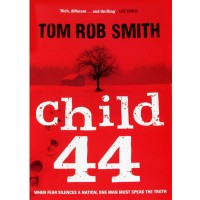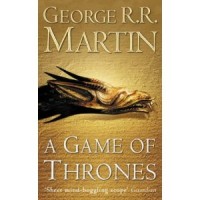Blog Archives
Belated reading and delayed writing: Child 44 and Game of Thrones
Hello again. It’s been a while, hasn’t it? But here we are again, this time pacing the boards in anticipation of MWF 2011. I’m very happy to be back here with Simon Keck and new MWF bloggers Jo Case and Stephanie Honor Convery; we’ll have an excellent time of it, I’m sure.
In the interim, I’ve been dividing my time between Oxford University Press, where I’m an editor; Kill Your Darlings, where I’m the Online Editor; writing about books here and there; and my online equivalent of a childhood house in the suburbs, 3000 BOOKS, where I try (with decreasing success) to record something about every book I read.
 I have less and less time to stick to the project these days, but it’s a good little system. On the one hand, while my untidy mind is likely to forget the details of a novel just read, or even a short story twice read, the internet never forgets. (Just try googling “Billy Joel demo tape”.) But on the other hand – and the other hand never has anything nice up its sleeve – it’s mortifying to realise how slowly I get through books, and to books. For example, only this year did I read Tom Rob Smith’s 2008 Booker-longlisted Child 44 (Smith was a MWF guest in 2009). The third book in his Cold War-era thriller series about secret police member Leo Demidov is coming out next month in the UK. So, while Smith has managed to write two follow-up books in the intervening years, I’ve only managed to read one of them. Luckily someone has their priorities straight.
I have less and less time to stick to the project these days, but it’s a good little system. On the one hand, while my untidy mind is likely to forget the details of a novel just read, or even a short story twice read, the internet never forgets. (Just try googling “Billy Joel demo tape”.) But on the other hand – and the other hand never has anything nice up its sleeve – it’s mortifying to realise how slowly I get through books, and to books. For example, only this year did I read Tom Rob Smith’s 2008 Booker-longlisted Child 44 (Smith was a MWF guest in 2009). The third book in his Cold War-era thriller series about secret police member Leo Demidov is coming out next month in the UK. So, while Smith has managed to write two follow-up books in the intervening years, I’ve only managed to read one of them. Luckily someone has their priorities straight.
Speaking of follow-up books, I was recently intrigued by Laura Miller’s piece in the New Yorker about George R. R. Martin, author of the medieval politics-meets-fantasy series A Song of Ice and Fire. Titled ‘Just Write It!’, Miller’s piece describes several groups in Martin’s large and passionate fanbase, one faction of which has taken against the author for not yet having delivered the fifth book in the series (Martin predicts that there will eventually be seven books in total). The fourth book, A Feast for Crows, was published in 2005.
That’s a pretty long wait. But of course, like a fool, I thought it would be a great idea to start reading the series regardless.  I’m now halfway through the second book, but I have no idea why I would torture myself with the prospect of a perpetual cliffhanger, particularly in a series noted for its complexity and non-traditional reward–morality ratio. (Martin has said that the fifth book will be published in July this year, and a television series based on the books may provide some relief should the book not materialise.) Even more a fool, I want to finish the book (a mere dash at 744 pages) before I hop on a plane for New York this Thursday.
I’m now halfway through the second book, but I have no idea why I would torture myself with the prospect of a perpetual cliffhanger, particularly in a series noted for its complexity and non-traditional reward–morality ratio. (Martin has said that the fifth book will be published in July this year, and a television series based on the books may provide some relief should the book not materialise.) Even more a fool, I want to finish the book (a mere dash at 744 pages) before I hop on a plane for New York this Thursday.
Anyhow, we’ll see how that goes. I’ll also be planning my holiday reading this week. I’m going to New York and Iceland, and am planning my book stash accordingly. More on that soon.
Black holes are cool: Alastair Reynolds & China Miéville
 I love it when the MWF puts on a genre session (Frontiers of the Imagination), not only because authors like China Miéville and Alastair Reynolds are cool, imaginative, erudite, funny and relevant; but also because you see young dudes in the audience! I don’t know what it is about genre fiction – perhaps it’s the ideas, perhaps the intertextuality – have the sci-fi/fantasy genres always been realms of youth? But then I know plenty of old dudes (BTW, this term for me encompasses male and female) who love spec fic – but don’t seem to be as excited about seeing the authors. Or is it when people get older they think they should be seen to be reading ‘serious’ fiction, instead of fiction about monsters and space ships?
I love it when the MWF puts on a genre session (Frontiers of the Imagination), not only because authors like China Miéville and Alastair Reynolds are cool, imaginative, erudite, funny and relevant; but also because you see young dudes in the audience! I don’t know what it is about genre fiction – perhaps it’s the ideas, perhaps the intertextuality – have the sci-fi/fantasy genres always been realms of youth? But then I know plenty of old dudes (BTW, this term for me encompasses male and female) who love spec fic – but don’t seem to be as excited about seeing the authors. Or is it when people get older they think they should be seen to be reading ‘serious’ fiction, instead of fiction about monsters and space ships?
But to the authors at hand. Jeff Sparrow began by asking about favourite authors, conscious influences. Some of Reynolds were, early on, Asimov, Clarke, Dick and more recently Lovecraft. In the ’80s, the cyberpunk movement was ‘enormously exciting’. Bruce Sterling’s Schismatrix totally blew Reynolds’ head off. He found it ‘forbidding and difficult to get into’ but sees now that it’s those kind of books that often had the most lasting impact. Reading it was ‘like someone had finally found the colour switch’ in a formerly black & white realm.
Miéville cites the New World writers such as Moorcock, Aldiss and Ballard as having an impact; and weird fic writers like Lovecraft. He noted other kinds of influences like Jane Eyre and Enid Blyton. He is ‘constantly awed by’ M John Harrison’s Viriconium Nights.
Reynolds had a former career as an astrophysicist and was a quiet writer of short stories – when the first novel came out the scientific community was very supportive and colleagues who previously ‘seemed very cautious’ of associating with science fiction came out of the woodwork as readers of the genre. Being a sci-fi writer has, oddly, opened up more doors for Reynolds than being a scientist ever did in terms of publication in certain journals, meeting science luminaries, seeing space ships take off and other cool stuff. Miéville complimented Reynolds though on the way his novels play ‘fast and loose’ and aren’t bogged down at all by ‘hard science’. Miéville made an awesome point about sci-fi being a fiction of ‘philosophical speculation’, not just scientific – and that of course there are the human sciences as well – what’s the use of depicting an incredible space ship when the characters don’t talk like real people?
Miéville is super interested in genre – in learning the intricacies of a genre and working within it ‘respectfully’. He did this with crime in The City and the City. Kraken is urban fantasy which has no sparkly vampires – it’s making the urban and the fantasy inexplicable. The city, London, ‘as a dream of itself’ he later said.
 Miéville is ‘a very neurotic planner’ with flow charts, notebooks etc., whereas Reynolds has a notion of where he’s going but then just ‘bulldozes in’. He does thus paint himself into corners ‘all the time’, but he backs out and tries again, enjoying the process of discovery.
Miéville is ‘a very neurotic planner’ with flow charts, notebooks etc., whereas Reynolds has a notion of where he’s going but then just ‘bulldozes in’. He does thus paint himself into corners ‘all the time’, but he backs out and tries again, enjoying the process of discovery.
They both spoke on the tradition of kinda ‘riffing’ (Miéville’s word) on classics of the genre. Reynolds says he consciously riffs on things but ‘no one gets them’. Miéville said it’s a very intertextual field but he suspects others might be too, such as crime, romance, lit fic. They’d both love to see their own creations and inventions riffed on well.
Sci-fi as a political genre was briefly discussed. Reynolds says he’s left-leaning, but in a ‘wishy-washy, Guardian reader sense’ which elicited quite a few laughs. Miéville is more politically active and he said in the UK he suspects the genre mainly leans to the liberal left, whereas in the US it’s more apolitical or split. Miéville thinks the genre is kinda essentially political because it throws up questions about things not really being the way they seem. But there’s also a kind of apolitical ‘joy’ in the field. As an example he spoke of gay, black, radical author Samuel R Delaney, but said, his books get read because, y’no, he ‘gives good spaceship’.